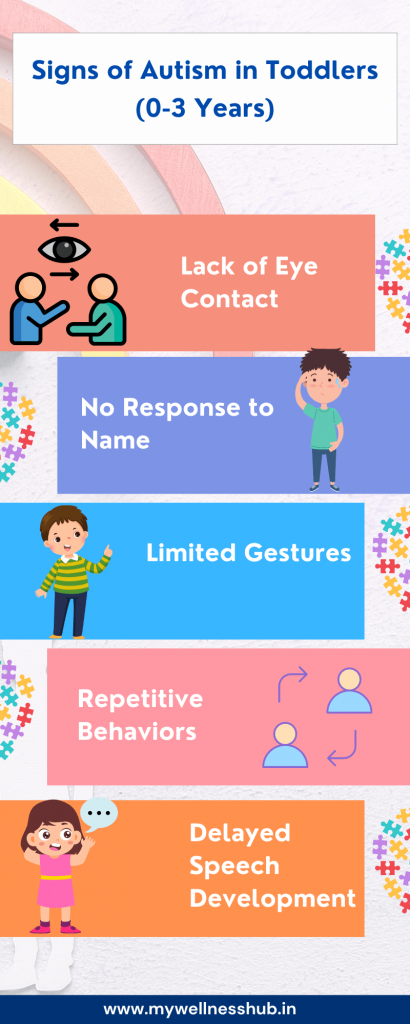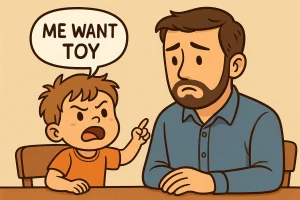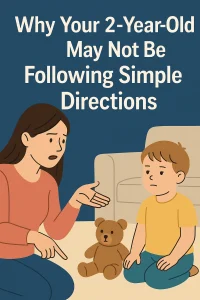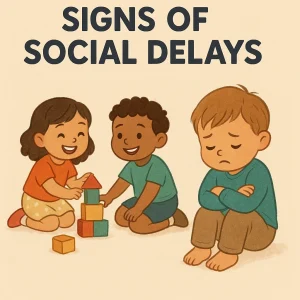Is Your Toddler Showing Signs of Autism? Free 0–3 Checklist
By Wellness Hub
Last Updated: August 9, 2024
Early detection of autism in children can greatly improve their development and support. Identifying signs before the age of three helps tailor interventions that can make a real difference. Our free autism checklist offers a simple, accessible way for parents and caregivers to start this crucial process. With our resources, you can take the first steps in understanding and supporting your child’s needs without any cost. Let’s ensure every child gets the best start in life by recognizing early signs of autism.
Discover your child’s developmental needs with our Autism Screening Tests—click here to start now!
Understanding Autism in Toddlers
Autism Spectrum Disorders in Young children
Autism Spectrum Disorders (ASD) represent a range of developmental issues that affect children from a very young age. Recognizing autism early can greatly influence a child’s social and educational development. In toddlers, autism may not always look the same as in older children. Therefore, knowing what signs to look for can be a game changer for parents and caregivers.

In children aged 0-3, the signs of autism often involve delayed milestones in communication, social skills, and behavior. Here are key symptoms you should monitor:
- Reduced Eye Contact: Toddlers with autism might avoid eye contact. They may not look at you when you call their name or when you try to engage them in visual games.
- Limited Response to Social Cues: Does your child respond when you smile or frown? Children with autism may struggle to interpret these common social signals.
- Delayed Speech Development: By the age of 3, most children can form simple sentences. If your child uses fewer words than peers or doesn’t use words at all, this could be a sign.
- Repetitive Behaviors: Watch for actions like rocking, spinning, or hand-flapping. These behaviors are common in toddlers with autism.
- Challenges with Changes: If your child gets unusually upset with changes in routine or environment, it might be a sign of autism.
- Unusual Play Patterns: Toddlers with autism might not play pretend games. They may also focus intensely on a single toy or play with toys in unusual ways, like lining up objects.
Also read: Understanding & Parenting an Autistic Child: Guide & Tips
Why Early Screening Matters
Early screening for autism can profoundly impact your child’s life and your family’s future. Detecting autism early isn’t just about labeling; it’s a proactive step towards unlocking the right support and resources that can significantly influence your child’s development.
1. Tailored Developmental Support Starts Early
When you identify autism early, you can start tailored interventions that cater specifically to your child’s needs. This early intervention is crucial because it taps into a crucial time of brain development when your child is most receptive to learning new skills. From speech therapy to behavioral interventions, early diagnosis opens a world of developmental aids that can help your child gain essential life skills, communicate more effectively, and navigate social interactions with greater ease.
2. Stabilizing Family Dynamics
Understanding your child’s needs early on can also bring a sense of stability and direction to your family planning. It equips you with the knowledge and tools needed to better support your child’s growth and integration into different social settings, including schools and community groups. Early diagnosis helps the entire family adapt to new routines and therapies, ensuring that every family member is part of a supportive home environment.
3. Planning for the Future Becomes Clearer
With early screening, you also gain the advantage of time. You can plan educational paths, explore suitable therapies, and connect with support networks, setting a foundation that will support your child’s long-term well-being. This proactive approach allows for a smoother transition into preschool and later schooling, tailored to your child’s unique developmental needs.
Early autism screening is not just a diagnosis; it’s the first step in a journey towards understanding and support. It empowers you as a caregiver to make informed decisions that pave the way for your child’s success across their lifetime. Engaging in early screening tests means you are setting the stage for a structured, supportive, and enriched developmental path for your child.
Key Developmental Milestones and Autism
When monitoring your child’s growth, understanding developmental milestones is crucial, especially in identifying early signs of autism. These milestones act as checkpoints in a child’s development and can signal if further evaluation might be necessary.
Below is a table outlining important developmental milestones that are closely observed during autism screenings. If your child misses any of these, it might be a sign to consult a professional for an autism assessment.
| Age | Social and Emotional Skills | Communication Skills | Cognitive and Physical Skills |
|---|---|---|---|
| 0-6 Months | – Smiles at people – Coos to show joy | – Reacts to sounds – Begins to babble | – Follows objects visually – Reaches for things |
| 7-12 Months | – Shows curiosity about things – Has favorite people | – Responds to own name – Uses simple gestures like waving | – Sits without support – Pulls to stand |
| 13-18 Months | – Imitates others – Exhibits fear in some situations | – Says several single words – Points to objects when named | – Explores alone with parent close by – Follows simple instructions |
| 19-24 Months | – Plays simple pretend games – Shows defiant behavior | – Speaks in two-word phrases – Begins to sort shapes and colors | – Runs – Kicks a ball |
| 25-36 Months | – Shows concern for crying friends – Understands mine/yours | – Follows simple instructions – Speaks in sentences | – Turns book pages one at a time – Climbs well |
Also read: Free Online Autism Checklist for Kids Aged 3-6 Years
It’s important to remember that each child develops at their own pace. However, consistently missing multiple milestones could be a reason for an autism screening test. Early detection and intervention can greatly improve outcomes. If you notice any delays in reaching these milestones, consider taking a Free Online Autism Test for Kids to understand better and seek necessary help.
Comprehensive Autism Assessment Tests
When it comes to understanding your child’s development, knowing about autism assessment tests can be incredibly valuable. These tests help determine whether a child might be on the autism spectrum by evaluating specific behaviors and skills.
There are several types of autism tests that experts use, each designed to assess different aspects of a child’s development:
- Developmental Screening Tests — These initial screenings often happen during regular pediatric check-ups. They help identify children who might need a more detailed evaluation.
- Behavioral Assessment Tests — These involve observing how a child interacts with their environment, other people, and during structured play. The goal is to see how well they communicate, move, and respond to social cues.
- Diagnostic Tests — Conducted by specialists like psychologists or pediatric neurologists, these tests are thorough and can confirm whether a child is on the autism spectrum.
Each test plays a crucial role in shaping the support and interventions that might benefit your child. Early detection through these assessments can lead to better outcomes, as it allows for earlier access to treatment and educational strategies tailored to your child’s needs.
For a more detailed understanding of what each autism screening test involves and how it can help your child, visit our Comprehensive Guide to Autism Screening Tests. This guide provides essential information that can assist you in making informed decisions about your child’s health and development.
Online Assessment for Autism
Online assessments provide a convenient and accessible way for parents to understand their child’s developmental progress. By using digital tools, you can quickly identify potential signs of autism from the comfort of your home.
How to Access and Use Online Autism Tests
Accessing online autism tests is straightforward. Follow these simple steps to get started:
- Visit the Website: Navigate to the dedicated autism assessment section on our website. Here, you’ll find a variety of tests tailored for different age groups and developmental stages.
- Select the Right Test: Choose the test that best suits your child’s age and needs. Each test is designed to provide insights specific to various aspects of autism spectrum disorders.
- Complete the Test: Follow the instructions to answer the questions about your child’s behavior and developmental milestones. The test is user-friendly and can be completed in a few minutes.
- Review the Results: Once completed, the test will provide immediate preliminary results. These insights can help guide your decisions on whether further professional evaluation is needed.
For parents looking to assess their child’s development quickly and without hassle, our online platform is the perfect solution. By providing immediate feedback, online tests can be a first step in seeking more comprehensive care if needed.
Take the Autism Test Online Here: Ready to start? Click here to access our online autism test—no downloads required, just direct action towards understanding your child’s needs.
This approach ensures that the information is not only accessible but also actionable, encouraging parents to take proactive steps in managing their child’s developmental health.
Supporting Your Child After an Autism Diagnosis
1. Taking Action After an Autism Diagnosis
Getting an autism diagnosis for your child can be overwhelming, but it’s important to act quickly. The right support and therapy can make a huge difference in your child’s development. Start by finding experts who specialize in autism. Early intervention programs offer tailored strategies to help your child thrive. These programs focus on improving communication, social skills, and behavior.
2. Connecting with Supportive Resources
It’s crucial to build a network of support. Join parent groups where you can share experiences and gain advice from others in similar situations. Look for online communities that provide resources and support. These groups can offer practical tips and emotional support, helping you feel less alone on this journey.
3. Exploring Therapy Options for Your Child
Therapies like speech therapy, occupational therapy, and behavioral therapy can be life-changing for children with autism. Start by consulting with a specialist who can recommend the best therapies for your child’s needs. Online resources can also guide you to local therapists and programs that suit your situation. Don’t wait—early intervention is key to helping your child reach their full potential.
Conclusion
Take action today. Early detection of autism can make a world of difference in your child’s life. By using our free autism checklist for kids aged 0-3, you are taking a proactive step towards understanding your child’s development. This simple, easy-to-use tool can help you identify early signs of autism and guide you towards the right support. Don’t wait. Access our free online autism test now and get the answers you need. Remember, early intervention is key, and we’re here to provide you with the resources you need to support your child’s growth.
Frequently Asked Questions
1. What is autism screening, and why is it important?
Autism screening is a process to identify signs of autism in young children. It helps parents and caregivers spot early developmental delays and seek timely interventions, which can make a big difference in a child’s growth and learning.
2. At what age should my child be screened for autism?
Autism screening can start as early as 18 months, but it’s often done between 2 and 3 years of age. Early screening allows parents to address any developmental concerns as soon as possible.
3. What are some signs of autism that parents should look for?
Signs of autism in young children include delayed speech, limited eye contact, difficulty interacting with others, and repetitive behaviors. If you notice these signs, it’s a good idea to talk to your child’s doctor.
4. How is autism screening done?
Autism screening usually involves answering a series of questions about your child’s behavior and development. These questions can be part of a checklist or an online test designed to identify potential signs of autism.
5. Is there a difference between autism screening and a full autism assessment?
Yes, autism screening is a preliminary step that identifies if a child might be at risk for autism. A full autism assessment is a more detailed evaluation done by professionals to diagnose autism officially.
6. Can I screen my child for autism online?
Yes, there are free online autism tests available that can help you screen your child. These tests are easy to access and provide a quick way to check for early signs of autism.
7. What should I do if the screening indicates my child may have autism?
If the screening suggests your child might have autism, the next step is to consult with a pediatrician or a specialist. They can guide you through a full assessment and recommend support services.
8. Are autism screening tests reliable?
Autism screening tests are generally reliable for identifying potential signs of autism, but they are not a diagnosis. It’s important to follow up with a professional evaluation for an accurate diagnosis.
9. Do I need to prepare anything before my child’s autism screening?
No special preparation is needed. However, it helps to observe and take note of your child’s behaviors, communication, and interactions with others, as these observations will be part of the screening.
10. How can I support my child after an autism screening?
After an autism screening, it’s important to stay informed and proactive. Seek professional advice, explore early intervention programs, and connect with support groups to help your child thrive.
About Company
Wellness Hub is dedicated to enhancing holistic wellness by leveraging a team of seasoned psychologists and management experts. Our professionals bring extensive experience in psychometric assessments, counseling, and behavioral skills training. We have crafted a robust suite of psychological tests, questionnaires, case studies, and exercises tailored to meet diverse wellness needs. Committed to innovation, Wellness Hub integrates cutting-edge technology to streamline and enrich our services, supported by skilled technical personnel to ensure seamless delivery and support. Our mission is to empower individuals through comprehensive and accessible wellness solutions.
Book your Free Consultation Today
Parent/Caregiver Info:
Client’s Details:
* Error Message









